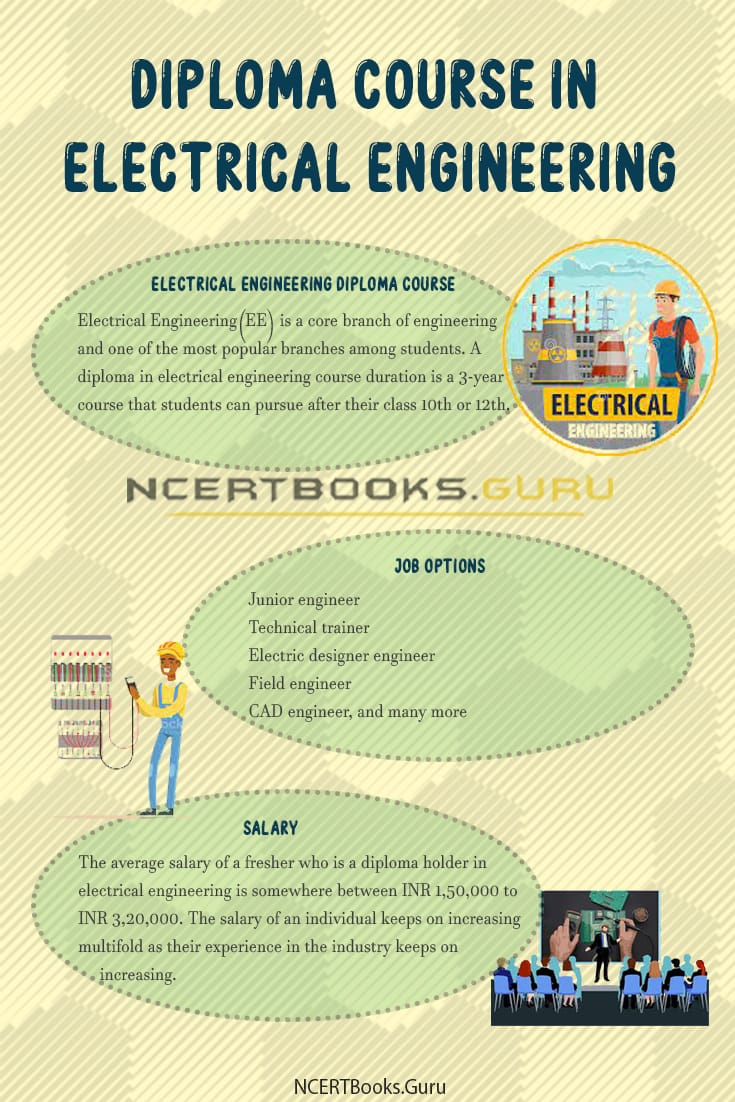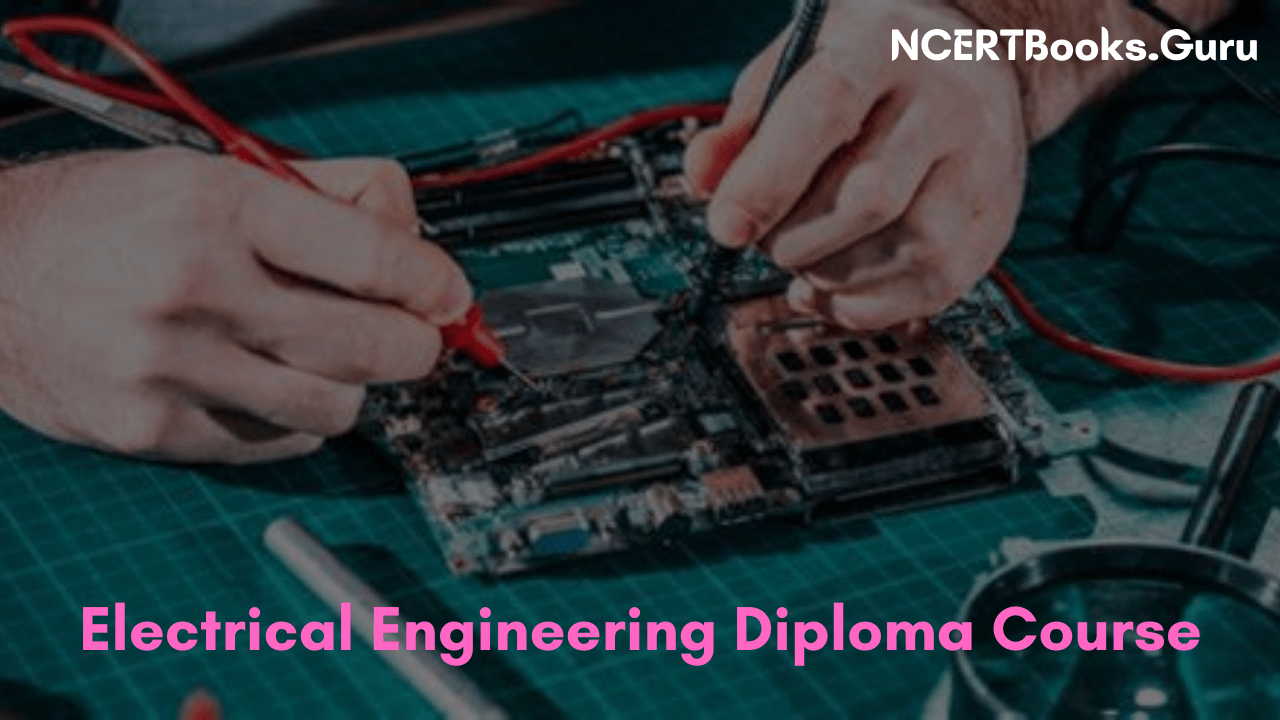Electrical Engineering Diploma Course: Electrical Engineering(EE) is a core branch of engineering and one of the most popular branches among students. A diploma in electrical engineering course duration is a 3-year course that students can pursue after their class 10th or 12th.
This course teaches the students about installation, maintenance, troubleshooting, signal processing, magnetism, and telecommunications. Entry into this course is based on merit or entrance examination. The fee for an electrical engineering diploma course is between INR 10,000 to INR 3,00,000. A fresher can expect a salary of up to INR 2,00,000 when they hold a diploma degree in electrical engineering.
This article contains complete information about the electrical diploma course details, eligibility criteria, admission process, top colleges in India, fee structure, syllabus, job options, top recruiters, salary. To know all about the electrical engineering diploma course, keep reading!
- Who Should do a Diploma in Electrical Engineering?
- Eligibility Criteria for an Electrical Engineering Course Diploma
- Diploma in electrical engineering admission 2022
- Types of Diploma in Electrical Engineering Courses
- Top Colleges for Doing a Diploma in Electrical Engineering
- Diploma in electrical engineering course fees
- Diploma in electrical engineering syllabus pdf
- Job Options for Students After a Diploma in Electrical Engineering Course
- Salary after an Electrical Engineering Diploma Course
- Top Recruiters That Hire Electrical Engineering Diploma Students
- Future Scope of Diploma Electrical Engineering Course
- FAQs on Diploma Course in Electrical
Who Should do a Diploma in Electrical Engineering?
Students who are interested in studying the electrical engineering domain should go for a diploma in electrical engineering course. The students who wish to increase their knowledge on different topics of science and mathematics such as distribution, generation, storage, conversion of electrical energy, etc, and learn about various types of equipment and work of electrical engineers must go for the course.
Passionate and ethical students who want to build up their own company in this department can go for this course. The employment opportunities for electrical engineers is increasing day by day since electronics have become a part of our daily life. A diploma in electrical engineering course offers a variety of specializations from which the students can choose according to their interests which will help them to focus on their area of interest and gain knowledge.
Also Read: How to become an Electrical Engineer in India
Eligibility Criteria for an Electrical Engineering Course in Diploma
Following are the eligibility criteria for students who want to enroll in an electrical engineering diploma course:
- The students must have passed their class 10th examination with a recognized Board of Education with at least 50% marks.
- The students must not have any backlog in their class 10th board examinations.
- Students must have studied science and mathematics with at least 50% marks in both of the subjects.
- In case of the students being from the reserved category, they must present their certificates of reservation.
- Some universities grant admission to students based on the common entrance examination and in such cases, the students must clear the entrance examination if they want to take admission to such colleges.
Diploma in electrical engineering admission 2022
Following is the admission process in the colleges for diploma electrical engineering course:
Entrance exam based:
- In case of taking admission in colleges that take an entrance examination, the students will have to get qualifying marks in the examination.
- After the entrance examination, a merit list will be published that will have the candidates who have passed their exams and are eligible for the next round.
- After the final admission process and the submission of the fee, the students will register themselves in the college or university for their academic year
Merit-based:
- The admission in a diploma in an electrical engineering course is mostly done based on the merit of the student based on their class 10 board examinations.
- Most colleges and universities offer a diploma in electrical engineering after class 10th and 12th.
Types of Diploma in Electrical Engineering Courses
Let’s look at the different types of course options that are available for students if they want to do a diploma in an electrical engineering course:
Full-time diploma in electrical engineering:
This is a 3 year-long professional course offered by various private and government institutions. The average fee for a full-time diploma in an electrical engineering course ranges somewhere between INR 10,000 to INR 2,00,000. The admission in this course is done through various entrance examinations such as Odisha DET, JEXPO, Assam PAT, etc.
Part-time diploma in electrical engineering:
The duration of a part-time diploma in electrical engineering is 4 years. It is provided to those people who are working and want to improve their skills in the domain of electrical engineering. The average fee for a part-time diploma in an electrical engineering course is somewhere between INR 35,000 to INR 50,000. The colleges that provide a part-time diploma in electrical engineering are the University of Calicut, MS University of Baroda, University of Kerela, and many more.
Diploma in electrical engineering after 10th:
Students can go for a diploma in electrical engineering course after they have completed their class 10th from a recognized Board of Education with a minimum of 50% marks. They must have maths and science as their subjects. This course is an application-based course that mainly focuses on practical application concepts.
Diploma in electrical engineering after 12th:
Most of the colleges offer electrical engineering diploma courses after the students have completed their class 12th. After getting the qualifying marks in the entrance examination students can apply for the course of diploma in electrical engineering. If they got selected in the entrance test their names will be published on the merit list.
Top Colleges for Doing a Diploma in Electrical Engineering
There are various universities and colleges across the country that provide premium quality education when it comes to the electrical engineering domain. Let’s look at the top colleges that provide diploma in electrical engineering courses:
- Aligarh Muslim University
- Bharati Vidyapeeth Deemed University
- Jamia Millia Islamia University
- CV Raman global University
- Lovely Professional University
- Veer Mata Jijabai Technological University
- Walchand College of Engineering
- Narula Institute of Technology
- Doctor B.R. Ambedkar Institute of Technology
- North Eastern Regional Institute of Science and Technology, and many more
Diploma in electrical engineering course fees
The fee for a diploma course in electrical engineering can be somewhere between INR 10,000 to INR 3,00,000 or more. The fee completely depends upon the College in which the student takes admission. The government colleges charge much lower than the private colleges.
Diploma in electrical engineering syllabus pdf
The syllabus of an electrical engineering diploma course is divided into 6 semesters. Let’s look at the semester wise 1-year diploma in electrical engineering subjects:
| 1st Semester | 2nd Semester | 3rd Semester | 4th Semester | 5th Semester | 6th Semester |
| Engineering mathematics 1 | Engineering mathematics 2 | Electronic devices and circuits | Digital electronics | Electrical machine controller | Electrical estimation and energy auditing |
| Engineering chemistry 1 | applied mathematics | Electrical circuit theory | Electrical machines 2 | Programmable logic controller | Computer hardware and networks |
| communication English 1 | Engineering physics 2 | Electrical machines 1 | Measurements and instruments | Power system 1 | Power system 2 |
| Engineering physics 1 | Communication English 2 | Electronic devices and circuits practical | Transducers and signal conditioners | Special electrical machines | Elective theory 2 |
| Engineering graphics 1 | Engineering graphics 2 | Electrical circuits and electrical circuits and machines practical | Digital electronics and linear integrated circuits practical | Microcontroller | Elective practical 2 |
| Engineering physics 1 practical | Engineering physics 2 practical | Computer applications | Communication and life skills practice | Elective theory 1 | |
| Engineering chemistry 1 practical | Engineering chemistry 2 practical | Electrical machines and instrumentation practical | Elective practical | ||
| Workshop |
Job Options for Students After a Diploma in Electrical Engineering Course
The demand for well-skilled electrical engineers is growing day by day. After completing a diploma in an electrical engineering course, the students can choose to work in the private field or in the government field by clearing entrance examinations for various government posts. Following are the top job profiles that students can work on after they have a diploma degree in electrical engineering:
- Junior engineer
- Technical trainer
- Electric designer engineer
- Field engineer
- CAD engineer, and many more
Salary after an Electrical Engineering Diploma Course
The average salary of a fresher who is a diploma holder in electrical engineering is somewhere between INR 1,50,000 to INR 3,20,000. The salary of an individual keeps on increasing multifold as their experience in the industry keeps on increasing.
Top Recruiters That Hire Electrical Engineering Diploma Students
Following are the top recruiters who hire electrical engineering diploma holders:
- Fuji Electric
- Eon Electric
- Cable Corporation of India Limited
- Emerson
- Abacus Consultants
- Mentor Graphics
- RGF Select India Private Limited
- Genlite Engineering Private Limited
- Center For Development of Advanced Computing
- Vijai Electricals Limited
- Mitsubishi Electric
- Servomax, etc.

Future Scope of Diploma Electrical Engineering Course
After completing a diploma in an electrical engineering course, the students can go for the following if they want to go for higher studies:
- Bachelor of Engineering in electrical and electronics engineering: Bachelor of Engineering in electrical and electronics engineering is a 4 year under graduation level degree and it deals with subjects of applying the concepts of electrical and electronics engineering to solve industry-related problems and issues.
- Bachelor of Technology in electrical engineering: Bachelor of Technology in electrical engineering is a 4-year undergraduate degree course. The electrical engineering course is about electricity and its fundamentals and also covers various topics of electromagnetism and electronics. It emphasizes the industrial factors of electrical engineering and its applications.
- Bachelor of Technology in electrical communication engineering: Bachelor of Technology in electrical communication engineering is a 4-year undergraduate course. It requires the application of knowledge in electronics to facilitate networking and communication. It helps the students to learn about electronics and communication aspects such as digital system design, digital signal processing, electronic circuits, and electromagnetic theory.
FAQs on Diploma Course in Electrical
1. When can I do an electrical engineering diploma course?
You can do a diploma in EE after completing a class 10th or class 12th. You can also go for a full-time electrical diploma course or a part-time EE diploma course.
2. What can I do after a diploma in an electrical engineering course?
You can either go for jobs in the government and private sector or you can go for higher studies after completing your electrical engineering course.
3. What are the top specializations of electrical engineering?
Following are some of the top specializations of electrical engineering:
- Network systems
- Microsystems
- Semiconductors
- Computer networking
- Signal and image processing, etc.
Conclusion
In this article, we have covered all the topics regarding the electrical engineering diploma course details, eligibility criteria, application process, top colleges, Syllabus, fee structure, salary, top recruiters, job options, future scope.
We wish that this article was able to provide you with the information that you were looking for and that you can make an informed decision for yourself. All the best!
